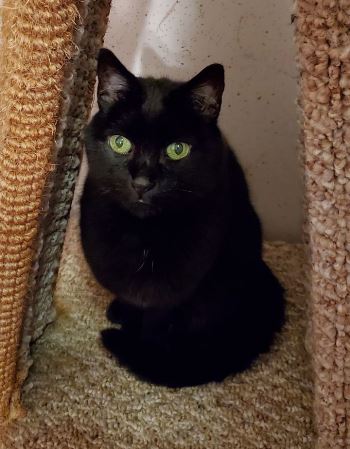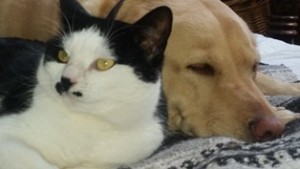Many of the things that make the holidays enjoyable for people can be harmful to our pets. Data indicates that emergency visits to animal clinics escalate from Thanksgiving through the New Year holiday. Here are some reminders to keep your pets safe and healthy.
Holiday Decorations – Consider pets when decorating. Dogs and cats are attracted to shiny objects like tinsel and glass bulbs and may chew on and swallow objects that require emergency care and surgery. Supervise animals around lighted Christmas trees and secure and inspect electrical wires daily. Avoid using food for decorations. Popcorn and cranberries strung on thread or string, for example, are a choking hazard for dogs and cats and can cause intestinal blockages which can be life-threatening.

Food and Treats – Your dog might find rich, high-fat foods such as turkey skin, butter and other ingredients used in baking are tasty treats, but these same foods can also make your dog very ill. Please be mindful and keep fatty table scraps, human baked goods, and candy away from pets, and discourage house guests from feeding pets as well. Other common offenders are chicken bones, fried chicken, dry brownie mix, and foil-wrapped chocolate. Treat your pet instead to foods and baked goods made especially for them that are pet-safe.
Cold Weather Caution: When temperatures dip below 40 degrees, dog owners should limit outside exposure for puppies, senior pets, and pets with diabetes, heart disease, kidney disease, and arthritis. Cold weather may worsen some medical conditions, and those pets with hormonal imbalances such as Cushing’s disease may have a harder time regulating their body temperature and may be more susceptible to problems from temperature extremes. Make sure you alert your veterinarian of any unusual or worsening symptoms during the winter. An exam may be in order, and therapy and/or medications may be prescribed to help your pet feel better during the cold winter months.
When walking your dog, remember that rough terrain, snow, ice, and road salt can cause paws to bleed and crack. Be mindful and protect your pets’ paws with boots while keeping them warm with sweaters and jackets. Clean and inspect paws when back inside and make sure no ice or ice melt remains on their paws.
In case of Emergency – Keep details of who to call and where to find help handy so all family members and even guests know what to do in case a pet ingests a foreign object or shows signs of illness. Visit Reasons to Call Your Veterinarian Immediately and find details for the Pet Poison Helpline and nearby Emergency Clinics on our Pet Emergency website page.
Belle Mead Animal Hospital, Your Other Family Doctors



